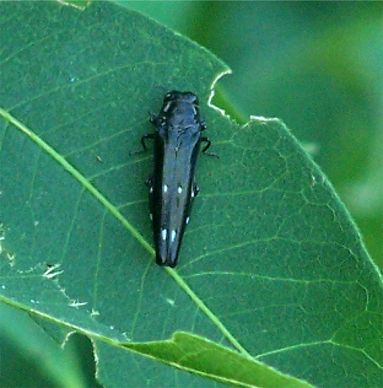 |
Return to Texas Entomology - Compiled by Mike Quinn
 |
Range: Texas (introduced), Mexico (native)
First reported in Bastrop County in 2003. Since then, it has been detected in several additional counties, including near or within the cities of Austin, College Station, Corpus Christi, Dallas, Fort Worth, Houston, and Waco.
It may eventually threaten western soapberry populations throughout the tree’s range, which extends from northern Mexico to Missouri, and west to Arizona.
Larval Hosts:
Western Soapberry - Sapindus saponaria L. var. drummondii
Western soapberry appears to exhibit little resistance to this introduced pest. No other tree species appear to be attacked by this insect.
Identification:
The adult beetle is about ½ inch-long, shining dark olive green and distinctively marked with four small white spots on the wing covers.
Biological Note:
This insect is killing all sizes of soapberry trees larger than 2 inches in diameter.
Bark chips accumulate at the base of the tree. A heavily-infested tree will be completely girdled by white larvae feeding beneath the bark.
Weblinks:
Soapberry Borer - Texas Forest Service
For more information or to report new infestations, please contact Dr. Ron Billings at (979) 458-6650, rbillings@tfs.tamu.edu
Etymology: Agrilus prionurus Chevrolat 1838
agri (L). A field
prion (G). A saw
Biography: Louis Alexandre Auguste Chevrolat (1799-1884) - Wikipedia
References:
Borror, D.J. 1960. Dictionary of Word Roots and Combining Forms. National Press Books, Palo Alto. v + 134 pp.
Wellso, S.G. & J.A. Jackman. 2006. A new species of Anthaxia (Haplanthaxia) Reitter (Coleoptera: Buprestidae) and new North American buprestid distributional and host records. The Pan-Pacific Entomologist 82(2): 262-268.
10 Dec 2019 © Mike Quinn / entomike@gmail.com / Texas Entomology / Texas Beetle Information